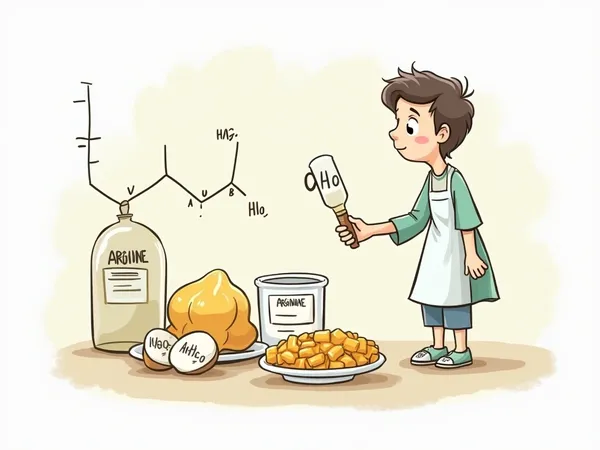
Ready to Start Your Wellness Journey?
Become a Herbalife Preferred Member and enjoy exclusive discounts of up to 25% on all products.
BECOME A PREFERRED MEMBERArginine Benefits for Heart Health and Performance Guide
Disclaimer: This article is for informational purposes only and should not be considered medical advice. Always consult a healthcare professional or a registered dietitian before making significant changes to your diet or starting any supplementation.
Introduction
Arginine, also known as L-arginine, is a semi-essential amino acid required for protein synthesis. While the body can produce arginine, certain conditions—such as injury or rapid growth—may increase demand. Arginine is a precursor to nitric oxide (NO), which contributes to vascular function, and is involved in the urea cycle for ammonia detoxification.
Role in the Body
Arginine participates in several metabolic pathways. It contributes to the removal of ammonia via the urea cycle and serves as a substrate for enzymes that produce bioactive compounds.
Specific Functions
Arginine’s roles include:
• Nitric oxide synthesis: Arginine is converted by nitric oxide synthase (NOS) into nitric oxide, a molecule involved in vasodilation and regulation of blood vessel tone.
• Urea cycle support: Arginine combines with ornithine and ammonia to form urea, facilitating nitrogen excretion in urine.
• Creatine production: In the kidney and liver, arginine contributes to the biosynthesis of creatine, important for cellular energy buffering in muscle.
• Immune function: Arginine is required for T-cell proliferation and may influence macrophage activity; some studies suggest that arginine supplementation can affect immune markers in specific populations.
• Hormone release: Arginine is used in clinical settings to stimulate the secretion of growth hormone during diagnostic testing.
Effects of Deficiency
Arginine deficiency is uncommon in healthy adults but can occur under catabolic or stress conditions, such as severe trauma or burns. Potential consequences include impaired wound healing, reduced immune responsiveness, and alterations in nitrogen balance.
Dietary Sources
Most individuals obtain sufficient arginine from dietary protein. Foods rich in arginine include:
Best Food Sources
• Turkey breast (approximately 16 g of arginine per 100 g)
• Chicken breast (around 6 g per 100 g)
• Pumpkin seeds (about 5 g per 100 g)
• Peanuts (roughly 3 g per 100 g)
• Soybeans (approximately 3 g per 100 g)
• Dairy products (yogurt and cheese providing 1–2 g per serving)
• Fish (salmon and tuna offering 2–3 g per 100 g)
• Legumes (lentils and chickpeas with 1–2 g per cooked cup)
Supplementation
Arginine supplements are used in research and clinical settings. Some studies have examined supplementation (typically 3–6 g/day) for:
• Cardiovascular health: Small trials have reported modest reductions in blood pressure in individuals with hypertension.
• Wound healing: Arginine-enriched medical nutrition has been studied in postoperative and burn patients.
• Erectile dysfunction: As a NO precursor, arginine has been evaluated for mild to moderate cases, with mixed results.
• Athletes: Research on exercise performance and recovery shows variable outcomes, and more studies are needed.
High doses may cause gastrointestinal symptoms and can interact with certain medications. Consultation with a healthcare professional is recommended before starting supplementation.
Health Benefits
Research supporting arginine-related effects includes:
Blood pressure: A 2009 meta-analysis in the American Journal of Hypertension reported average reductions of 5 mmHg systolic and 2.7 mmHg diastolic with arginine supplementation in hypertensive subjects.
Wound healing: Clinical trials have shown that arginine-containing nutrition can enhance collagen synthesis and wound closure rates in surgical and burn patients.
Immune markers: Some studies—such as a trial in Clinical Nutrition (2014)—observed improvements in immune parameters among elderly participants receiving arginine-enriched supplements.
Glucose metabolism: Preliminary research indicates potential effects on insulin sensitivity and glucose regulation, though further studies are needed.
Daily Requirements
No formal Recommended Dietary Allowance (RDA) has been established for arginine. Intake is typically met through protein consumption. Estimates of dietary arginine range from 4 to 6 g/day in adults consuming a balanced diet. Individual needs may be higher during periods of growth, illness, or physical stress.
Tips for Incorporation
To include arginine-rich foods in your diet:
• Snack on pumpkin seeds or peanuts.
• Add lentils, chickpeas, or tofu to salads and soups.
• Include lean poultry and fish regularly.
• Mix Greek yogurt with nut butter and fruit.
• Sprinkle hemp or chia seeds over meals.
• Use protein powders containing arginine post-workout.
• Plan meat-free days featuring legumes and seeds.
• Explore recipes combining multiple arginine sources, such as nut-crusted fish or bean salads.
Conclusion and Call to Action
Arginine contributes to nitric oxide production, nitrogen metabolism, and protein synthesis. Most people meet their needs through a varied diet, though supplementation has been studied in specific clinical contexts. Before making changes to your nutrition or supplement regimen, consult a healthcare professional or registered dietitian.
Ready to Start Your Wellness Journey?
Become a Herbalife Preferred Member and enjoy exclusive discounts of up to 25% on all products.
BECOME A PREFERRED MEMBER